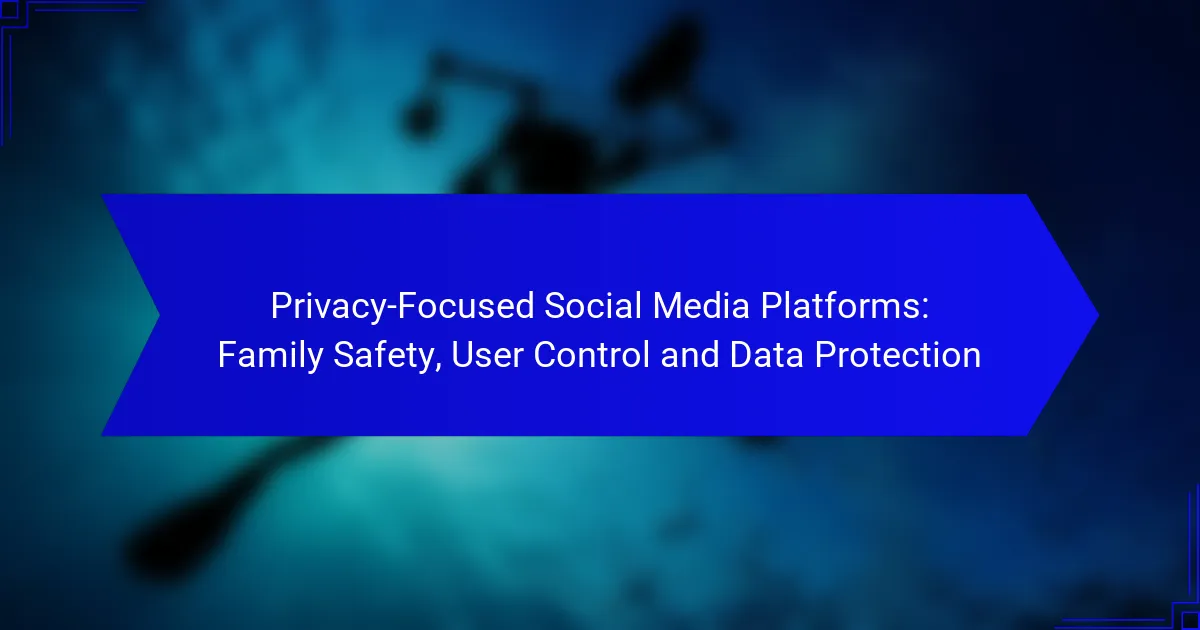In an age where online privacy is paramount, privacy-focused social media platforms offer families a secure way to connect while safeguarding personal information. These platforms prioritize user control and data protection, ensuring that family members can engage in a safe online environment. With robust security features and customizable privacy settings, users are empowered to manage their data effectively.
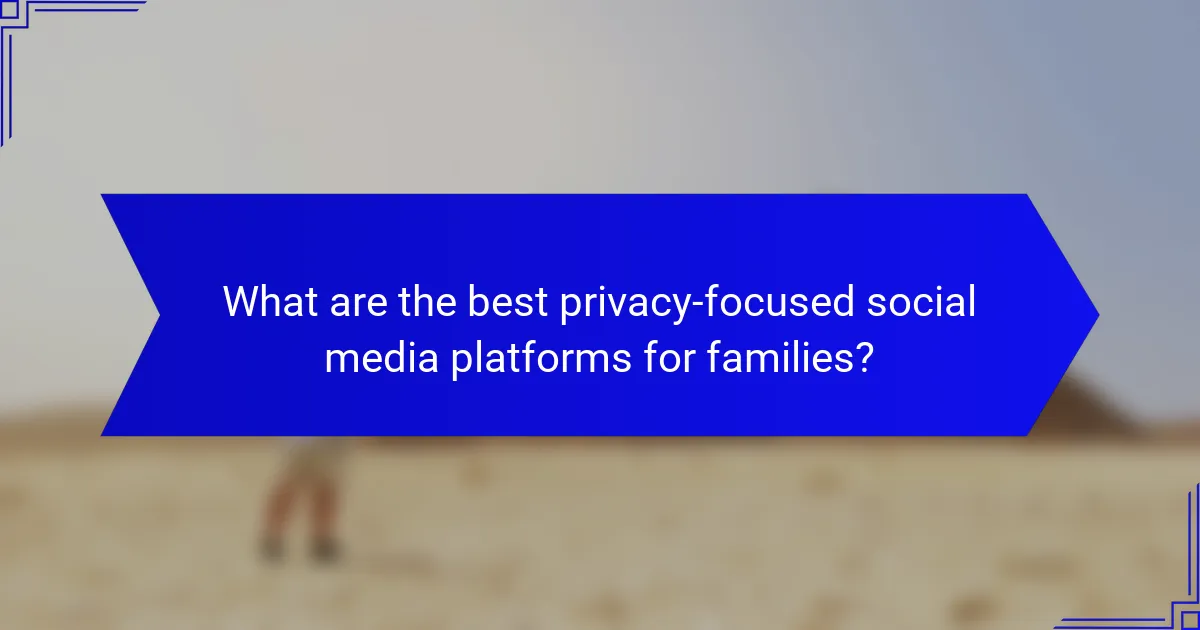
What are the best privacy-focused social media platforms for families?
The best privacy-focused social media platforms for families prioritize user control, data protection, and safety features. These platforms help ensure that family members can connect without compromising their personal information.
Signal
Signal is a messaging app known for its strong encryption and commitment to user privacy. It does not store user data, making it a secure choice for families who want to communicate without fear of surveillance.
Signal offers features like disappearing messages and end-to-end encryption for all communications. Families can use it for group chats, voice calls, and video calls, ensuring that their conversations remain private.
MeWe
MeWe is a social media platform that emphasizes user privacy by not selling data or showing ads. It allows families to create private groups, share photos, and communicate freely while maintaining control over their information.
With features like customizable privacy settings and the ability to manage who sees posts, MeWe is suitable for families that want a safe online environment. Users can also choose to limit interactions to friends and family only.
Telegram
Telegram is a messaging app that offers both public and private channels, making it versatile for family use. It provides end-to-end encryption for secret chats and allows users to send large files, making it practical for sharing family memories.
Families can create private groups to communicate and share content securely. However, users should be aware that while Telegram offers strong privacy features, some data may still be stored on its servers, so understanding its settings is crucial.
Facebook (Privacy Settings)
Facebook provides various privacy settings that families can adjust to enhance their safety online. Users can control who sees their posts, limit friend requests, and manage app permissions to protect personal information.
To optimize privacy, families should regularly review their settings and use features like audience selectors for posts. It’s also advisable to educate younger family members about the importance of maintaining privacy on social media.
Instagram (Privacy Features)
Instagram offers several privacy features that are beneficial for families, including private accounts and the ability to restrict who can comment on posts. By setting an account to private, only approved followers can see shared content.
Families should utilize features like story controls and comment filters to enhance safety. Regularly reviewing followers and being cautious about accepting requests can help maintain a secure environment for family interactions.
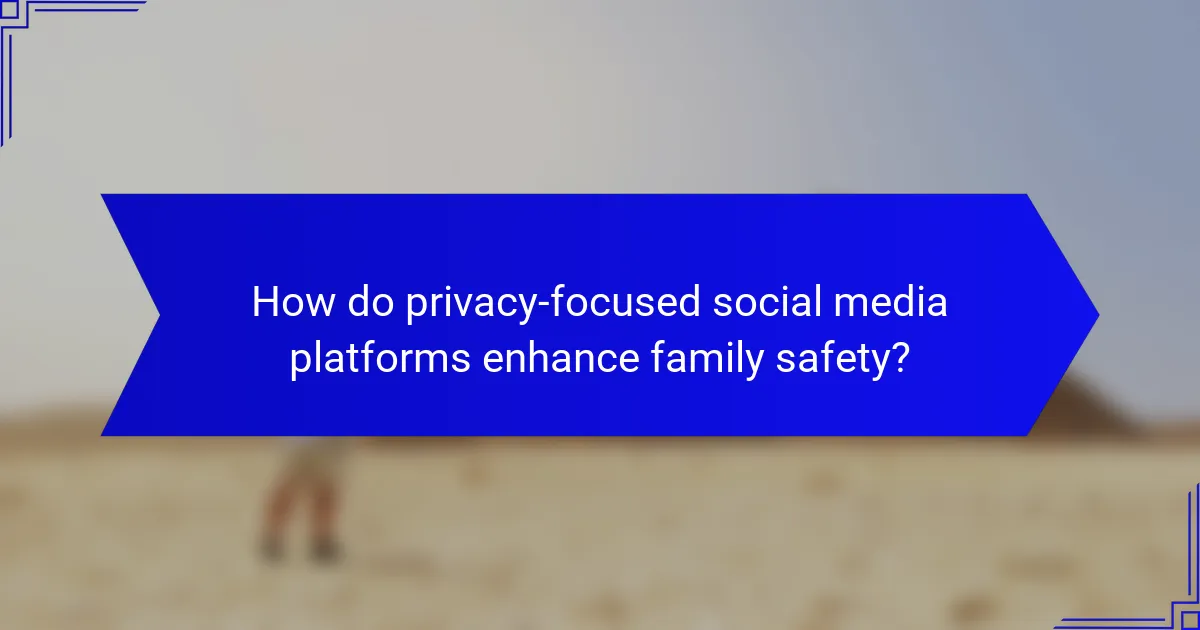
How do privacy-focused social media platforms enhance family safety?
Privacy-focused social media platforms enhance family safety by implementing robust security features and user control mechanisms. These platforms prioritize data protection, allowing families to engage in a safer online environment.
End-to-end encryption
End-to-end encryption ensures that only the communicating users can read the messages exchanged on the platform. This means that even the platform itself cannot access the content, providing a significant layer of security against unauthorized access.
For families, this feature is crucial as it protects private conversations from potential threats, such as hackers or data breaches. Popular messaging apps like Signal and WhatsApp utilize this technology, making them suitable choices for privacy-conscious users.
Content moderation tools
Content moderation tools allow users to filter and control the type of content that appears on their feeds. These tools can include customizable settings to block inappropriate content, ensuring a safer experience for children and teenagers.
Many platforms offer features like keyword filters and reporting options, enabling families to manage exposure to harmful or unwanted material. Engaging with these tools can help parents create a more secure online space for their children.
Parental controls
Parental controls are essential for managing children’s online interactions and safeguarding their privacy. These controls can restrict access to certain features, set time limits, and monitor activity, allowing parents to oversee their child’s social media usage effectively.
Platforms such as Facebook and Instagram provide built-in parental control options, enabling families to customize settings based on their specific needs. Utilizing these features can help ensure that children engage safely and responsibly on social media.
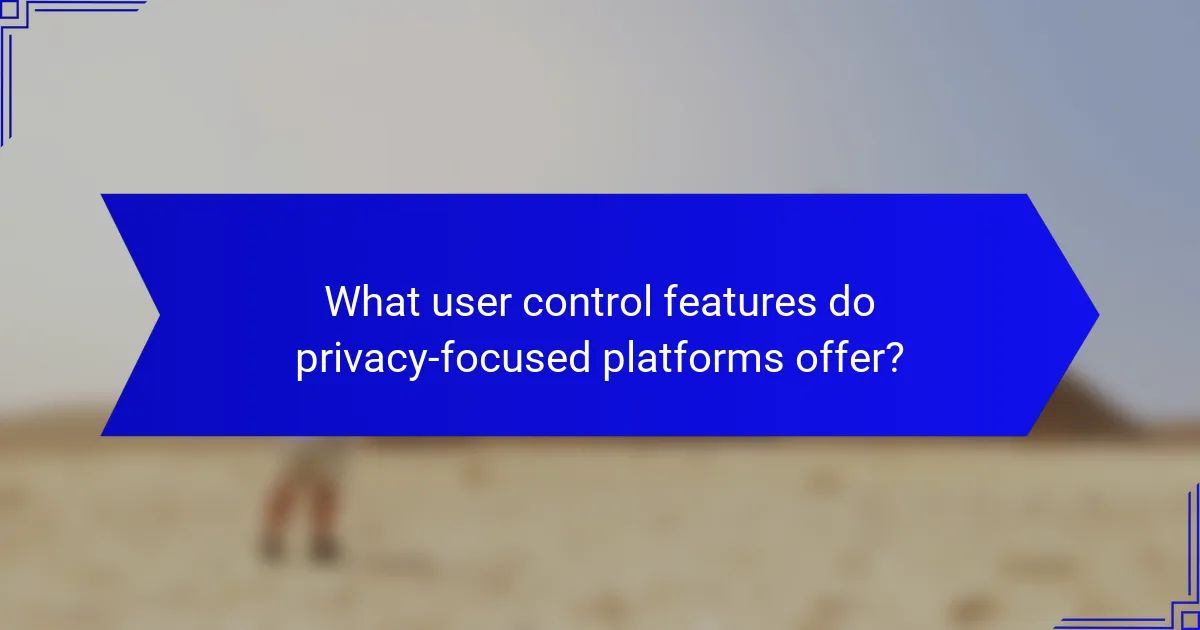
What user control features do privacy-focused platforms offer?
Privacy-focused social media platforms provide various user control features designed to enhance data protection and empower users. These features typically include options for data ownership, customizable privacy settings, and transparency reports that inform users about how their data is handled.
Data ownership options
Many privacy-focused platforms allow users to retain ownership of their data, meaning they can control how it is used and shared. This often includes the ability to download personal data, delete accounts, or even transfer data to other services. Users should look for platforms that clearly outline their data ownership policies to ensure they maintain control.
For instance, some platforms may offer features that allow users to export their content in standard formats, making it easier to switch services without losing valuable information. Understanding these options can help users make informed decisions about their online presence.
Customizable privacy settings
Customizable privacy settings are essential for users who want to tailor their social media experience. Privacy-focused platforms typically provide granular controls that let users decide who can see their posts, who can contact them, and what personal information is visible to others. Users should take the time to explore these settings to maximize their privacy.
For example, a user might choose to limit their profile visibility to friends only or restrict certain posts to specific groups. Regularly reviewing and updating these settings can help maintain a secure online environment.
Transparency reports
Transparency reports are documents that detail how a platform handles user data, including requests from law enforcement and third parties. Privacy-focused platforms often publish these reports to build trust with their users and demonstrate their commitment to data protection. Users should look for platforms that regularly update these reports and provide clear insights into their data practices.
These reports can help users understand the extent of data sharing and any potential risks associated with using the platform. By staying informed, users can make better choices regarding their social media interactions and data security.
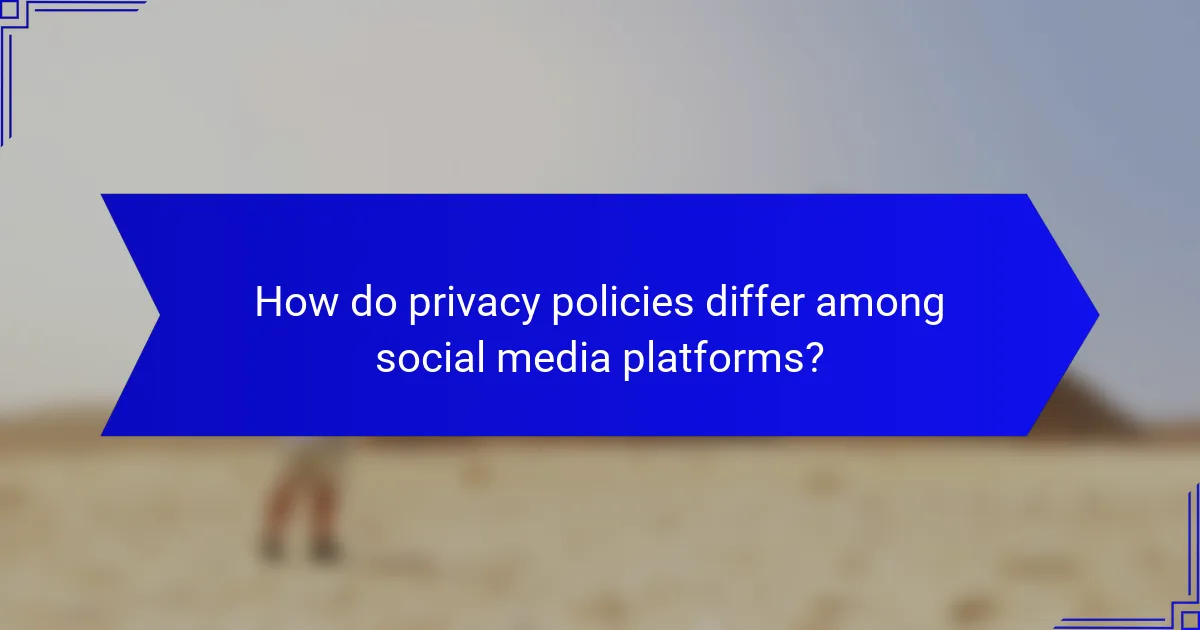
How do privacy policies differ among social media platforms?
Privacy policies among social media platforms vary significantly in terms of user data handling, retention, and sharing practices. Understanding these differences is crucial for users who prioritize family safety, user control, and data protection.
Comparison of data retention policies
Data retention policies dictate how long social media platforms keep user data after account deletion or inactivity. Some platforms may retain data for a few months, while others can hold onto it for years, often citing legal obligations or service improvement needs.
For example, Facebook typically retains user data for up to 90 days after account deletion, while Twitter may keep certain information indefinitely. Users should review these policies to understand how their data is managed over time.
Third-party data sharing practices
Third-party data sharing practices vary widely, influencing user privacy. Some platforms may share user data with advertisers and partners for targeted marketing, while others limit such sharing to enhance user privacy.
For instance, platforms like Signal emphasize user privacy by not sharing any data with third parties, whereas Instagram, owned by Facebook, shares data extensively to facilitate ad targeting. Users should be aware of these practices to make informed choices about their social media use.
GDPR compliance
GDPR compliance is a critical factor for social media platforms operating in or serving users in the European Union. Platforms must adhere to strict regulations regarding user consent, data access, and the right to be forgotten.
For example, platforms like LinkedIn and Facebook have implemented features that allow EU users to manage their data more effectively, including options to delete their accounts and request data access. Users outside the EU should still consider GDPR compliance as a benchmark for data protection standards.
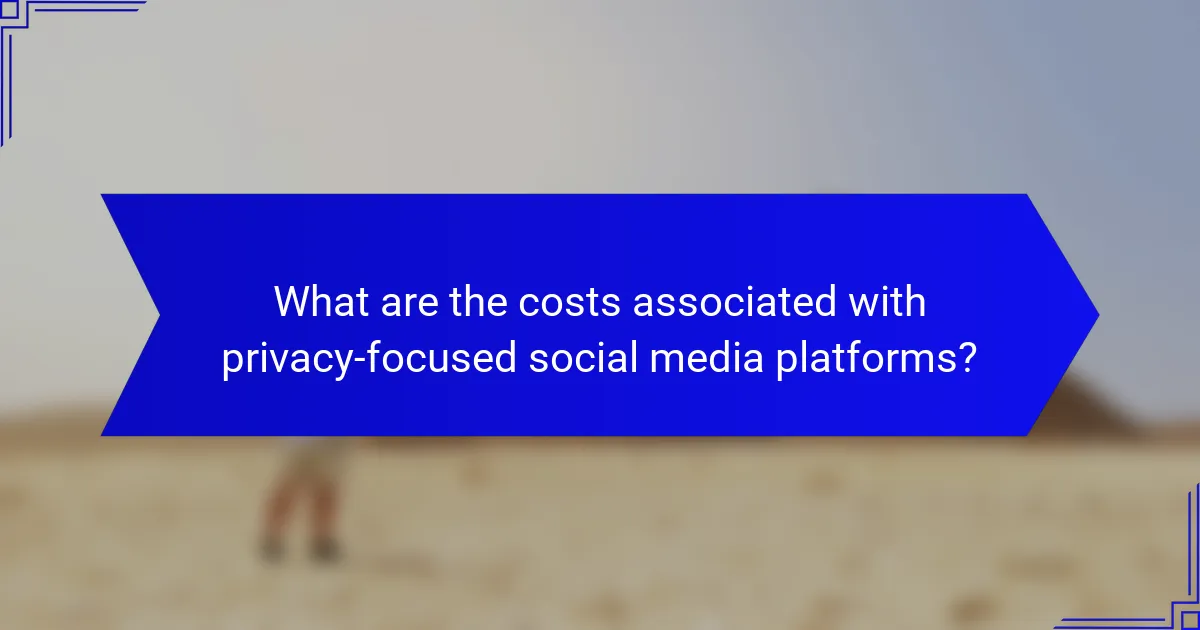
What are the costs associated with privacy-focused social media platforms?
Privacy-focused social media platforms often come with various costs, both monetary and non-monetary. Users may encounter subscription fees for premium features, while free versions might limit functionality or include ads that compromise privacy.
Free vs. premium features
Free versions of privacy-focused social media platforms typically offer basic functionalities, allowing users to connect and share content without charge. However, these options may come with limitations such as ads, reduced storage, or restricted access to privacy settings.
Premium features usually require a subscription fee, which can range from a few dollars to over ten dollars per month, depending on the platform. These subscriptions often provide enhanced privacy controls, additional storage, and an ad-free experience, making them appealing for users who prioritize data protection.
When considering whether to opt for free or premium features, evaluate your privacy needs and how much you are willing to invest in safeguarding your data. If privacy is a top concern, the benefits of premium options may outweigh the costs.
